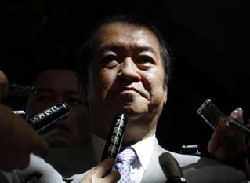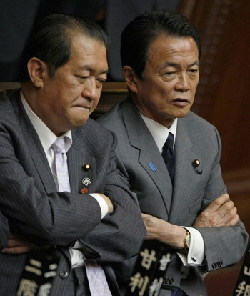
TOKYO -- Japan Internal Affairs Minister Kunio Hatoyama, a close ally of Prime Minister Taro Aso, resigned on Friday, in a blow to Aso ahead of a looming election.
Hatoyama had insisted that Yoshifumi Nishikawa, president of Japan Post, should be replaced, though many in the ruling party have said Nishikawa should stay in his job, creating a dilemma for Aso in recent weeks.

Japan Internal Affairs Minister Kunio Hatoyama is surrounded by reporters after tendering his resignation to Prime Minister Taro Aso at Aso's official residence in Tokyo June 12, 2009. Hatoyama, a close ally of Prime Minister Taro Aso, resigned on Friday, in a blow to Aso ahead of a looming election. [Agencies]
"It is hard for the public to understand why the row has become such a big issue," said political commentator Akira Hayasaka, adding that the internal row within the cabinet gives a negative impression of Aso's government.
"It will be a minus for his party ahead of the election."
The move would end the row over the personnel issue. But it would be a blow to the unpopular prime minister after opposition parties have criticised Aso for a lack of leadership in failing to solve the problem quickly.
Aso's Liberal Democratic Party faces a tough battle in a general election due by October, with the main opposition Democratic Party now leading in voter polls.
An opposition victory would end half a century of almost unbroken rule by the conservative LDP.
In a Yomiuri newspaper poll on Monday, 39.1 percent of respondents said they would vote for the Democrats, compared with 28.7 percent who preferred the LDP.
Japan Post was broken up into four state-owned firms in 2007 as the first step in a 10-year privatisation process driven by former Prime Minister Junichiro Koizumi.

Japanese Prime Minister Taro Aso (R) attends a plenary session with Internal Affairs Minister Kunio Hatoyama at the lower house in Tokyo in this March 4, 2009 file photo. [Agencies]
Stakes in two of the four units, one for banking and one for insurance, are to be sold by 2017. But as the ruling party drifts away from Koizumi's reforms, Aso's government has suggested aspects of the plan should be reviewed.
It would not be the first time an Aso ally has had to leave the cabinet. In February, then finance minister Shoichi Nakagawa resigned after being forced to deny he was drunk at a G7 news conference.
Support for Aso, Japan's third prime minister in less than two years, fell below 30 percent in a poll by public broadcaster NHK this week after he flip-flopped on policy and rowed publicly with Hatoyama, even as the economy struggles with its deepest recession in decades.